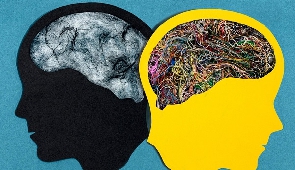Son of the renowned preacher, Archbishop Nicholas Duncan Williams has been in the news lately for throwing tantrums and engaging in indecent exposure.
This wouldn’t be a first and he wouldn’t be the first in Ghana to have gone through this condition; the bipolar disorder.
At various points, two persons; Former AIDS Ambassador Joyce Dzidzor Mensah and Former University of Cape Coast student Abena Korkor, have also emerged to speak openly about their situations and explain their similar ‘escapades’; both attributing it to a relapse of the situation.
Currently, Daniel Duncan Williams is in the news, after a first episode where he was seen smoking and making offensive utterances about his father. This time, it appears worse. Aside from sex videos, he is constantly spitting ‘wild’ words through his social media pages.
His father; Archbishop Duncan Williams who confirmed this in a tweet, explained that Daniel’s current situation is resultant of his failure to continue his prescribed medications.
The public didn’t necessarily help with the circulation and ‘noise’ surrounding that. What most people don’t know is that his eruption is characteristic of bipolar persons. So, what is bipolar?
GhanaWeb, in this piece, delves into the issue of the bipolar condition and everything about it:
Sometimes termed as ‘maniac-depressive disorder’ or ‘maniac depression’, Bipolar disorder is a chronic or episodic mental disorder; meaning, it occurs occasionally and at irregular intervals, according to the National Institute of Mental Health.
It comes with various episodes of mood swings, changes in sleep, energy, thinking and behaviour. At one point, a bipolar person can feel extremely happy, and enthusiastic, and at another, they drown in depression, with feelings of sorrow, and hopelessness.
Mood swings are normal, everyone moves in between moods sometimes but bipolar disorder is different. The range of mood changes can be extreme.
Most of the time, bipolar disorder happens during the late teen years or early adulthood. Occasionally, bipolar symptoms can appear in children.
Although the symptoms come and go, bipolar disorder usually requires lifetime treatment and does not go away on its own. Bipolar disorder can be an important factor in suicide, job loss, and family discord, but proper treatment leads to better outcomes.
What causes bipolar disorder (BD)?
Research suggests there is no one cause of bipolar but it is caused by a range of factors that interact. Researchers however say genetic factors, biological traits including brain-chemical imbalances, hormonal problems and environmental factors all contribute to BD.
Types of bipolar disorders:
Bipolar disorders include four subtypes:
Bipolar I disorder: It involves manic or mixed episodes with mixed features, with or without psychosis and or major depression.
Bipolar II disorder: It involves hypomanic episodes (persistent disinhibition and mood elevation (euphoria), with behaviour that is noticeably different from the person's typical behaviour when in a non-depressed state), with major depression but without any major manic episodes unlike in the case of (I).
Cyclothymia disorder: It involves persistent hypomanic and depressive symptoms that are not very intense, to be described as hypomanic or depressive. It usually doesn’t last over 3 years.
Unspecified bipolar is a category that refers to bipolar disorder symptoms that do not match any of the recognized categories.
Symptoms of bipolar; Likely characters a bipolar patient will exhibit:
The symptoms of bipolar disorder can vary. An individual with bipolar disorder may have manic episodes, depressive episodes, or “mixed” episodes. A mixed episode has both manic and depressive symptoms. National Institute of Mental Health divides symptoms into two categories
SYMPTOMS OF A MANIC EPISODE
Feeling very up, high, elated, or extremely irritable or touchy, - Feeling jumpy or wired, - More active than usual, - Racing thoughts, - Decreased need for sleep, -Talking fast about a lot of different things (‘flight of ideas’), -Excessive appetite for food, - Drinking, - Sex, or other pleasurable activities, thinking you can do a lot of things at once without getting tired, - Feeling like you are unusually important, talented, or powerful.
SYMPTOMS OF A DEPRESSIVE EPISODE
Feeling very down or sad, or anxious, - Feeling slowed down or restless, - Trouble concentrating or making decisions, - Trouble falling asleep, waking up too early, or sleeping too much, - Talking very slowly, feeling like you have nothing to say, or forgetting a lot, - Lack of interest in almost all activities, - Unable to do even simple things, - Feeling hopeless or worthless, or thinking about death or suicide.
Treatment
Treatment of mood episodes depends on the presenting phase of illness: mania, hypomania, mixed state, depression, or maintenance. The condition is usually treated with medications, psychotherapy or a combination of treatments.
- Whilst certain medications help control symptoms, various medications are used for various symptoms depending on the individual.
- Psychotherapy, also called ‘talk therapy’ is sometimes used as a healing technique. It helps an individual identify and change troubling emotions, thoughts and behaviours. It is often used in combination with medications.
- Electroconvulsive therapy is used sometimes for bipolar patients with extreme episodes. It is a brain stimulation procedure that can help people get relief from severe symptoms of bipolar disorder. This type of therapy is usually considered only if a patient’s illness has not improved after other treatments (such as medication or psychotherapy) are tried, or in cases where rapid response is needed, as in the case of suicide risk and catatonia (a state of unresponsiveness).
Coping and helping patients with Bipolar Disorder:
Bipolar disorder makes life challenging for its patients but there are ways of making it easier for the patients and the role of the family, public and the media matters in the healing process.
Bipolar patients:
-Get treatment and stick with it—recovery takes time and may be challenging but consistency matters. - Keep medical and therapy appointments, and talk with the provider about treatment options. - Take all medicines as directed. - Structure activities: keep a routine for eating and sleeping, and make sure to get enough sleep and exercise. - Learn to recognize your mood swings. - Ask for help when trying to stick with your treatment.
Family
Psychologist, Aku Hayfron told GhanaWeb, that though it is a difficult thing for any family to deal with, they need to be supportive. She suggested these ways the family can help their bipolar patient and avoid relapses.
- To ensure that the patient takes his medication regularly in order that they don’t get a relapse.
- Put the patient in constant contact with a psychiatrist or a psychologist who will be able to help them keep up with medication and also help them know what triggers the relapse.
- Constant checks and support
Public
- Social support helps
According to Aku Hayfron, the attacks, criticism and insults from the public are not helpful for any bipolar patient. This is because, the person is not conscious of his or her actions at the time, and therefore is not responsible for whatever is going on.
Media
Aku Hayfron believes media publications should ideally not be done about such persons especially knowing their conditions. Whilst admitting that the world has changed in recent times and the media really dwells on such information to make news, she noted that it is important for news reporters to speak to the families of these persons in such cases before coming out with their information.













